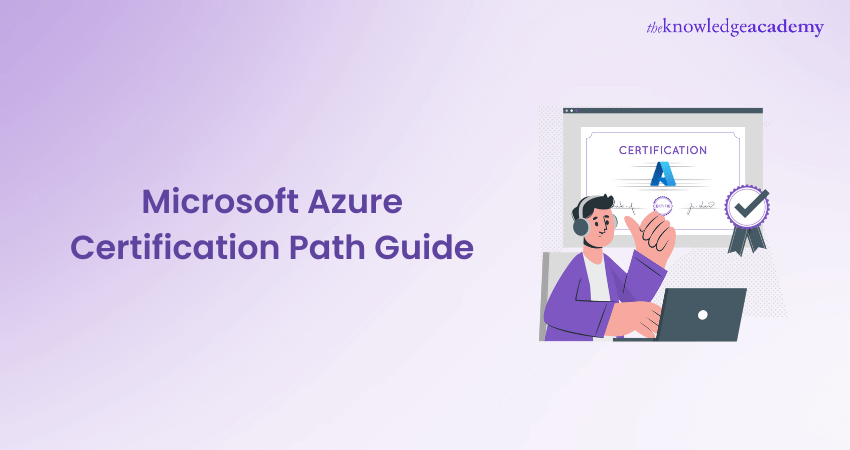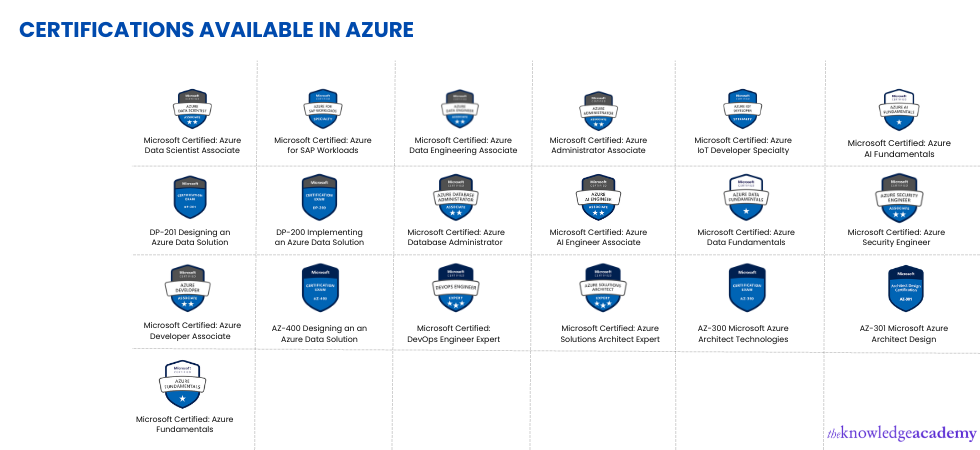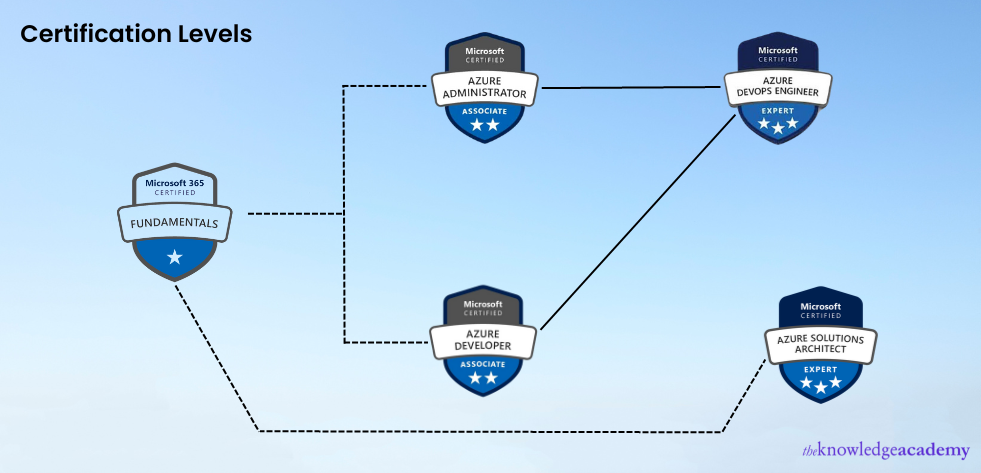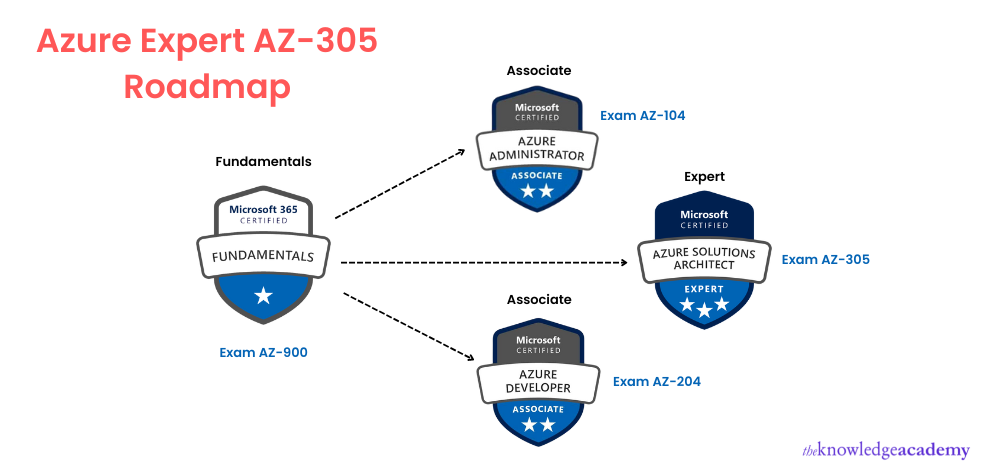We may not have the course you’re looking for. If you enquire or give us a call on 01344203999 and speak to our training experts, we may still be able to help with your training requirements.
Training Outcomes Within Your Budget!
We ensure quality, budget-alignment, and timely delivery by our expert instructors.
- Designing and Implementing Enterprise-Scale Analytics Solutions Using Microsoft Azure and Microsoft Power BI DP500
- Microsoft Azure Administrator AZ104
- Data Engineering On Microsoft Azure DP-203 Certification
- Microsoft Azure Security Technologies AZ500
- Designing And Implementing Microsoft DevOps Solutions AZ400

While unveiling various new features for Azure Services, Microsoft also replaced many role-based Azure Certifications by launching new ones. Microsoft made such changes based on feedback it got from the examiners. However, even to this day, AZ-900, "Microsoft Azure Fundamentals Certification", is still the entry point for many other Azure Certifications.
Microsoft Azure Certifications are considered one of the most desired IT-based certifications in the industry. According to Statista, almost 70 per cent of organisations worldwide use Microsoft Azure for their cloud services, increasing the viability of Azure Certification. And according to Microsoft, more than 95 per cent of Fortune 500 companies trust Azure Services for their business due to Azure's hybrid capabilities. Go through this blog to know which Microsoft Azure Certification Path is the best to choose in 2023 for your career. Read more!
Table of Contents
1) What is Microsoft Azure Certification?
2) Why get certified in Microsoft Azure?
3) Choosing the correct Certification Path
a) Beginner-level certification
b) Associate-level certification
c) Specialty certification
d) Advanced-level certification
4) How to prepare for Microsoft Azure Certifications?
5) Conclusion
What is Microsoft Azure Certification?
In the recent bloom of cloud computing and cloud-based systems thanks to Azure cloud services, the demand for Azure-based Specialists has increased more than ever. Based upon endless roles that came alongside Azure, such as Azure based Machine Learning, many openings for various specialisations in Azure Services were created.
Microsoft Azure proved to be a determining method of the skillset for Azure specialists and got popular relatively fast. This raises the question, “What is Microsoft Azure Certification?”. Let's start with Microsoft Azure Services; Azure Services like Azure Virtual Machine are widely recognised around the globe as the most prominent cloud-based service provider of the era.
Microsoft Azure was single-handedly responsible for designing specific standards for qualifying various certifications in cloud-based tasks and operations. These certifications were designed to specialise in various tasks and usage of Microsoft Azure-based cloud services. They are one of the extremely valuable certifications available in the IT segment.
Microsoft Azure Certifications are a series of certifications and exams made with the intent of helping cloud computing professionals on starting their career in this domain. Depending on your experience level, there are many Certification Paths available in Azure, ranging from beginner-level fundamentals to expert levels. Microsoft Azure’s popularity and adoption rate within the industry has increased over the past years.
Why get certified in Microsoft Azure?
In order to understand the necessity of getting certified in Microsoft services, you must grasp the importance of Azure Cloud Services. Cloud services have become dominant in the private and public sectors alike.
There are constant barrages of upgrades in tech and methodologies, all being designed and implemented to keep Azure updated. Naturally, cloud aspirants and cloud-related IT professionals need to keep up with constantly evolving technologies. Irrelevant of whether you wish to move into a higher-paying job or wish to demonstrate your already existing skills with cloud-based tech, Microsoft Azure gives you a grounding to prove your skills.
You might wonder, “Yeah, but why would you pursue Azure Certifications in particular? Why can’t you go for AWS (Amazon Web Services) certifications or Google Cloud certifications?”. The reasons behind it are pretty simple, Microsoft has been making brilliant moves by playing to its unique strengths.
Microsoft has been using its legacy to its advantage in the industry. Microsoft did it by easing most organisations into cloud tech that were once reluctant to it, solely based upon its credibility. This resulted in high demand for Azure-based skill sets and various opportunities for you and other users to put Azure-based skills to use.
There may be always a possibility that your current or future employer uses Azure-based services, giving you an edge in your future role. Alternatively, you might be just invested in the future of cloud tech, and the potential it holds. Perhaps you wish to build an arsenal of knowledge and validate that said knowledge to build your own diverse skill set.
Regardless of your reason for pursuing Azure Certification, it's more than keeping up with its contenders and giving AWS and Google a run for their money. This makes it worth considering when you choose to build your future in cloud tech by getting certified in Azure.
Over the past few years, Azure has been the most favoured cloud service for tasks such as hybrid deployment. In the industry, it naturally plays well with Microsoft solutions, thanks to them branching parts of the same company. Aside from this, all Azure Certification exams can be taken remotely, giving people with a busy schedule some flexibility in how they approach it.
Choosing the correct Certification Path

This is the best time to develop your cloud skills in Microsoft Azure and upgrade your career due to its high demand. If you are wondering what’s the best path and order for you to approach Microsoft Azure Certification, it is perfectly normal to feel confused.
There are over dozens of Azure Certifications and countless orders in which you can approach them depending on your future goals and aspirations. However, on a general level, everyone starts with Microsoft Azure Fundamentals, and the steps taken after that vary from person to person.
While this blog may not be able to predetermine a learning path on your behalf, if you wish to build a career in cloud services, this blog can offer you an overview to help you with building your learning path. Take your time learning about the various certifications Azure offers, and you will discover precisely what you’re looking for.
Before we progress further, understand that Azure cloud certifications hold great value. Azure’s certifications derive a high demand and value due to one core reason, “job specific skills”. Most certifications are specifically designed while keeping a particular job role in mind. Azure Certifications show employers you have specific skills and knowledge suited for the necessary role.
Thanks to such a simplistic naming system, the certification names make it pretty straightforward and self-explanatory as to what you’re getting yourself into. (This is a relief compared to Azure's often confusingly named exams.)
Beginner-level certification
The fundamental level exam requires a person to pass a single exam once to be certified in Azure and is generally considered a beginner-level exam and certification. Azure Certification for beginners generally uses the term “Fundamentals” in the naming process for all beginner-level certifications.
1) Microsoft certified; Azure Fundamentals (AZ-900)
It was made to validate the fundamental knowledge about Microsoft Azure Services. As the name states, it focuses on the fundamentals of Azure. It is made for beginners and focuses on the purpose and usage of Azure. It covers almost all essential topics of Azure, ranging from sales and purchases to back-end work and tasks like development. It's essentially a gateway to the Azure cloud services exam. which encompasses recognising the significance of Azure Pipelines in automating deployment procedures and adhering to Azure-900 principles.
Azure fundamentals are excellent for those with no or zero technical backgrounds, allowing them to master the very basics of the subject before they try and aim for higher courses in the future. Azure fundamentals have no prerequisites as of now and cover most simple skills like cloud scalability and the cloud's founding concepts. The ease in difficulty level and general syllabus makes it the perfect Azure Certification for beginners.
Wish to start your Azure Certification journey? Join our course in Microsoft Azure Fundamentals AZ900 Course Outline!
2) Microsoft Certified: Azure Data Fundamentals (DP-900)
This certification is an excellent choice if you aspire to start a career in a data-focused cloud role. It focuses on Data Analytics, Core Data, Data Ware-housing (analysing central repository of data), Data Ingestion and pProcessing, usage of Microsoft Power BI, and Data V` `isualisation. It also covers basic knowledge of simple data concepts, such as relational and non-relational data.
While this certification is not a prerequisite for more advanced certification and examinations, it will help you later if you wish to take the Azure Data Engineer Associate role or be an Azure Database Administrator Associate. This Certification has zero prerequisites as of now.
Interested in Big Data and analytics? Join our course in Microsoft Azure Data Fundamentals DP900!
3) Microsoft Certified: Azure AI Fundamentals (AI-900)
Azure AI fundamentals is a good choice for both candidates with a technical background and non-technical background. It focuses on a candidate's knowledge of Artificial Intelligence (AI) and Machine Learning (ML). Some concepts it covers are Machine Learning Principles, NLP (Natural Language Processing), and AI workload.
This certification doesn't have any prerequisites, but knowing the general level of programming will be helpful for those that wish to take this exam. This certification is a beneficial stepping stone if you wish to pursue AI Data Engineer or Azure Data Scientist roles.
Prepare for AI certification in Azure with our course in Microsoft Azure AI Fundamentals AI900 and design your own A.I!
Associate-level certification
Associate-level certifications are considered intermediate-tier certifications. These are intended for people who clearly understand Azure concepts or have already cleared one fundamental Certification.

1) Microsoft Certified: Azure Stack Hub Operator Associate (AZ-600)
This certification is designed to cover skills like networking and virtualisation management. It also covers how the Azure stack hub enables the DevOps process. This is an excellent certification for Azure stack hub operators as well as Azure Admins who provide users with cloud-based services. This certification demands experience with Azure stack hub management and operations.
Join our course - Configuring and Operating a Hybrid Cloud with Microsoft Azure Stack Hub AZ600, and give a jump start on road to being Stack Hub Operator.
2) Microsoft Certified Azure administrator associate (AZ-104)
An associate-level certification, Microsoft Azure Administrator Associate focuses on all tasks regarding monitoring resources. This includes tasks like identification, computing, storage, and governance. This is an intermediate-level exam, and a candidate approaching it needs to have some knowledge of ARM templates, Power Shell, Portal, and Azure CLI.
3) Microsoft Certified: Azure Data Engineer Associate (DP-203)
A data engineer associate is expected to design data platforms, as well as implement, monitor, and optimize them if the need be. Their secondary task is to use different tools and techniques to main compliant data, which is used to help any involved stakeholder understand the data.
Candidates pursuing this certification need a strong coding foundation in languages like Python, Scala and SQL. They are also expected to know well about services like Azure-Data Factory and Azure Databricks.
4) Microsoft Certified: Azure Database Administrator Associate (DP-300)
A Database Admin Associate is expected to handle Azure Data Services with Microsoft SQL (Simple Query Language) Server. Their common tasks expect them to work with SQL, and various tools and methods, such as T-SQL. This certification demands good knowledge in Azure SQL edge and Azure SQL database.
5) Microsoft Certified: Azure Security Engineer Associate (AZ-500)
Made to verify a candidate's ability to implement security measures and threat protection protocols, thus managing identity and access. Their core task is to protect data, applications, and cloud networks. They are expected to be well versed in virtualisation and networking principles alongside cloud N-tier architecture, so they can prevent threats and vulnerability by providing different security solutions.
6) Microsoft Certified: Azure Data Scientist Associate (DP-100)
An Azure Data scientist, as their name implies, works with data science. Their core task is to implement a machine learning workload on Azure. An Azure data scientist is required to be knowledgeable in data science principles and has some knowledge of the usage of Azure Data Bricks. Their key roles include deploying, managing, and optimising machine learning models if need be.
7) Microsoft Certified: Azure Developer Associate (AZ-204)
An Azure dev associate focuses on designing cloud-based applications and other services. They are also responsible for building, maintaining, and testing them if necessary. This is a demanding certification that requires you to be able to code in a programming language that is supported by Azure. It also demands a working tier proficiency in technologies like Azure Power Shell, Azure CLI, Azure SDKs, Data connections, and storage options. They also work with API, application authorisation, and authentication.
8) Microsoft Certified: Azure Network Engineer Associate (AZ-700)
Designed to be an extension of AZ-104, it builds further knowledge upon your pre-existing experience with networking. It covers routing implementation, Vnet, hybrid networking, and implementing private access in Azure Services.
You are strongly recommended to get certified in AZ-104 before approaching this certification. You must understand networking-based topics, such as specific networking protocols.
9) Microsoft Certified: Azure AI Engineer Associate (AI-102)
An artificial intelligence engineer must create and deploy AI solutions as well as manage pre-deployed AI solutions to maintain the smooth functioning of Azure Cognitive Services and MS bot framework. This is a good choice for you if you have already cleared Azure AI fundamentals or have a good grasp of the topic. Although it is not a prerequisite, it's a good idea to have basic coding skills if you aim for this role.
10) Microsoft Certified: Azure Enterprise Data Analyst Associate (DP 500)
If you wish to approach this exam, you need to have a good grasp of data management, be it data processing or data repositories. It is strongly recommended that candidates refine their skills in Power BI, letting them turn incoherent data offset into valuable insights. Some other prerequisites are being able to use DAX (Data Analysis Expression) as well as TSQL (Transact-SQL).
Specialty certification
Designed while keeping specific roles in mind. The certification is suitable for those who aim to go for one particular job, specifically after getting certified per Microsoft standards.
1) Microsoft Certified: Azure IoT Developer Specialty (AZ-220)
This certification is perfect for you if you wish to aim for an Azure IOT role. This certification tests the candidate's coding knowledge, as their daily tasks will involve creating, managing and implementing IOT solutions. It also requires you to have a thorough knowledge of the development and deployment process of Microsoft Azure IOT solutions.
Perquisites for this certification demand a strong grasp of coding fundamentals and complete fluency in at least one of a few Microsoft Azure-supported programming languages like C, C#, NODE, and Python. This exam also demands AZ-220 certification in “Microsoft Azure Developer”.
Got no previous coding experience? Change that with our Python Programming Training today!
2) Microsoft Certified: Azure Architect for SAP Workloads Specialty (AZ-120)
This certification is designed for engineers and architects who have a clear understanding and working experience with the SAP ecosystem. It also demands that you know industrial norms related to SAP Azure Solutions. It is ideal for you if you already have deep knowledge of the sap landscape and wish to gain more knowledge in Azure-integrated SAP.
There are no real prerequisites for this certification, but it is strongly suggested that you have an Azure Architect or Azure Administrator Certification. Getting certified in Linux OS and SAP HANA is an additional plus point for you.
3) Microsoft Certified: Azure Cosmos DB Developer Specialty (DP-420)
This certification is often considered popular in a series of Azure Certifications. As the name implies, the certification is designed around mastering the Cosmo Database. What separates the Cosmo database from a standard database is features like having no SQL at all and letting Microsoft take care of the messy work.
Additionally, the Certification demands a deep understanding of Cosmo DB and the process of developing apps in it. The prerequisite for this Certification demands a strong foundation in Azure Cosmo DB and decent experience in Azure-based app development.
4) Microsoft Certified: Azure Virtual Desktop Specialty (AZ-140)
Azure Virtual Desktop Certification is an excellent choice for you if you have hands-on experience with virtual desktops. Your job will involve managing, planning, or delivering them and using remote applications on Microsoft Azure. If you can use virtual desktop infrastructure tech, that is even better. It is highly sought after to have CLI and PowerShell skills in this role. It is suggested that any candidate that approaches this exam has expert Azure administration skills, hence an excellent grasp of the topic as a prerequisite.
5) Microsoft Certified: Azure Support Engineer for Connectivity Specialty (AZ-720)
If you believe you excel in planning, maintaining and implementing networking solutions, such as hybrid solutions, this is the Certification for you. This Certification also requires you to discern if something is wrong based on your knowledge and judgment and fix them. The prerequisite for this exam is essentially an AZ-700 exam (Designing and implementing Microsoft solutions) for the most part, but with the bonus of being able to break and fix the system.
Advanced-level certification:
The highest certification in Azure Certification levels is approached after you have successfully finished your intermediate and associate certification. After clearing a prerequisite associate exam, you can successfully take expert certifications.

1) Microsoft Certified: Azure Solutions Architect Expert (AZ-305)
If you understand cloud design and hybrid solutions in Azure, this certification is for you. After this certification, you'll be able to compute, monitor, and perform security-based tasks in Azure and have a good understanding of network and storage. Additionally, you will be required to advise and implement requirements into Azure Solutions designs to make them more scalable and secure.
Since the core task of this job role is to implement the solution on Azure, they often work alongside admins, developers, and another role similarly responsible for implementing solutions.
If you wish to pursue this certification, you need advanced knowledge and experience in IT operations. The operations generally consist of virtualisation, networking, identity, security implementations, business continuity, and data recovery during a disaster.
How to prepare for Microsoft Azure Certifications?

Microsoft Azure-based certifications can be confusing. They can seem like an endless series of exams without previous knowledge. But by keeping certain factors in mind, it can be serialised and you can form your own Microsoft Azure Certification roadmap. There are various online classes and training courses to prepare you for these certification exams. Your first step should be to understand the exams you invest your time in.
Read about the exam and research for certifications that match your skill level and future aspirations. Check the scope and prerequisite of every exam that you wish to pursue. Take time to understand the syllabus distribution and weightage, and look up a few exam guides. After you have finished a course, always take practice tests, available online, to understand your chances of passing the exam.
Take external reviews and guides into consideration as well. Check out exam guides and certifications white paper, and read some instruction books that show good certification roadmaps. It helps you realise if you should get certified in a beginner or an intermediate level exam and what next step you should take. It will take some time, but your Azure Certification Path will seem clearer to you as you keep learning further.
Conclusion
Organisations worldwide have a high demand for Azure Certified specialists and professionals, as the certifications are proof of your knowledge and skill set. Certification can open gateways for you to build up the needed work experience. However, a good job and role come with knowledge. Having a well-decided Microsoft Azure Certification Path enables you to pursue that knowledge.
A certification exam proves your knowledge and expertise in a particular aspect of Azure Services. Certifications validate and boost your skills and give future employers a chance to gauge your skill level at first glance. Azure Certification is a positive point in your resume, which can be a tiebreaker between you and a candidate aiming for the same position.
Frequently Asked Questions
Upcoming Microsoft Technical Resources Batches & Dates
Date
 Microsoft Azure Fundamentals AZ-900 Certification
Microsoft Azure Fundamentals AZ-900 Certification
Fri 14th Jun 2024
Fri 12th Jul 2024
Fri 9th Aug 2024
Fri 13th Sep 2024
Fri 11th Oct 2024
Fri 8th Nov 2024
Fri 20th Dec 2024







 Top Rated Course
Top Rated Course



 If you wish to make any changes to your course, please
If you wish to make any changes to your course, please


